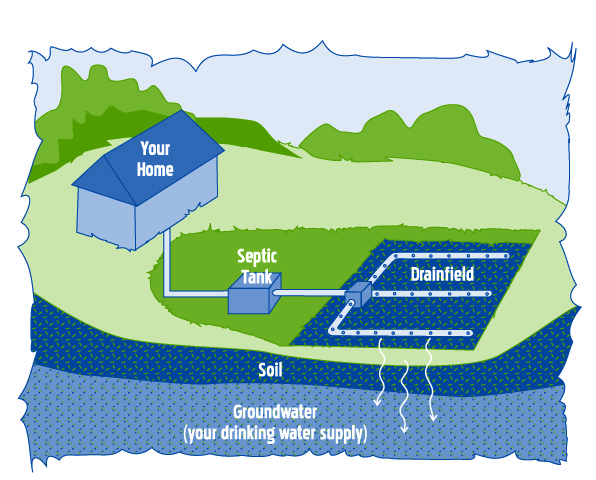
,,,,,,,,,,,,,,,,,,,,,,,,,,,,,,,,,,,,,,,,,,,,,,,,,,,,,,,,,,,,,,,,,,,,,,,,,,,,,,,,,,,,,,,,,,,,,,,,,,,,,,,,,,,,,,,,,,,,,,,,,,,,,,,,,,,,,,,,,,,,,,,,,,,,,,,,,,,,,,,,
On-Site Wastewater Treatment Systems
If you are the owner of an on-site wastewater treatment
system, you must take steps to ensure you are not causing damage to your
property, your family, the environment, and the property and families of those
around you
The
Groundwater Foundation
On-site wastewater treatment systems are a popular method of
disposing of sewage in the United States, especially in rural areas that do not
have readily available sewer lines.
About 25% of the US population owns an on-site wastewater
treatment system, according to the National Environmental Services Center.
If you are the owner of an on-site wastewater treatment system,
you must take steps to ensure you are not causing damage to your property, your
family, the environment, and the property and families of those around you.
What is it and how does it work?
Installing an on-site wastewater treatment system on your
property can be much more beneficial to the environment than running miles of
sewer lines to your property.
Unfortunately, in many cases, once an on-site wastewater
treatment system is installed, it is often forgotten until it malfunctions.
When the system is installed on your property, you are the one
responsible for it.
According to the United States Environmental Protection Agency
(US EPA), about 10-20% of on-site wastewater treatment systems malfunction each
year.
More often than not, system malfunction or failure is nearly
always a result of improper maintenance by the owner.
An on-site wastewater treatment system can fail for a number of
reasons, but usually point to improper maintenance by the owner.
Not having your system inspected often enough can cause the
owner to miss key factors contributing to a wastewater treatment system
failure.
Properly maintaining your on-site wastewater system will not
only save you money in the long run, it's also important for protecting
groundwater supplies and ensuring safe drinking water for you, your family, and
your neighbors.
According to the National Environmental Services Center, systems
should be inspected every 1-2 years by a professional and pumped when
necessary.
If maintained correctly, your wastewater treatment system can be
beneficial and environmentally-friendly, but without regular maintenance, it
has the potential to affect groundwater supplies and cause harm you and those
around you.
Having your wastewater treatment system regularly inspected and
pumped can avoid unnecessary expenses, damage to your property, damage to
neighbor’s properties, damage to the environment, and damage to the health of
you, your family, and families around your property.
The Groundwater Foundation is operated by the National Ground Water Association.


No comments:
Post a Comment